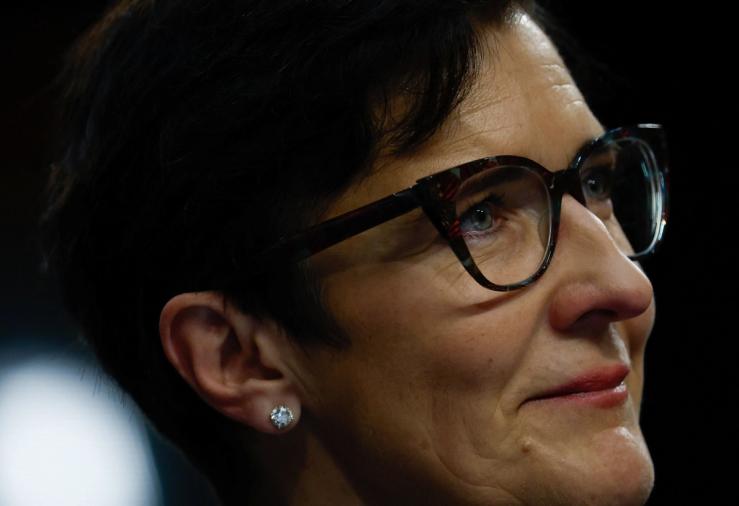The News
Big banks are losing the Washington lobbying battle — and they know it.
The ascendant crypto sector is eclipsing what was once a powerhouse industry. Digital-assets companies, which poured more than $26 million into President Donald Trump’s political apparatus this year alone, got their own White House czar, David Sacks; notched a major legislative win with recently enacted stablecoin legislation; and have the support of the president’s family, which has raked in billions from related businesses.
That one of the biggest and most economically central industries got outmaneuvered by a sector that was, until recently, on the fringes speaks to the new pecking order.
But beyond demonstrating crypto’s clout, the moves reflect how much Washington influence has changed since Trump’s first term — when he brought Wall Street executives to a televised Oval Office visit, calling them “probably the best bankers in the world.” Now they’re walking a political tightrope, as Silicon Valley executives have a direct line to the White House and the administration accuses banks of punishing conservatives.
The shifts helped spur Citigroup CEO Jane Fraser to change the head of the Financial Services Forum, which represents the eight largest US banks, eight months after she became the lobbying group’s chair, according to people familiar with the matter.
Amanda Eversole, a former public affairs executive at JPMorgan Chase who previously worked in advocacy and management for the oil lobby, replaced Kevin Fromer as FSF president and CEO earlier this month. She is viewed as a more aggressive personality than her predecessor; Fraser called her a “strategic leader with a strong track record of delivering results amid times of change.”
FSF spokesperson Barbara Hagenbaugh said Fromer “fostered bipartisan collaboration” and “provided steady leadership during significant challenges, such as the COVID pandemic and regional banking turmoil, when the largest banks strongly supported customers, businesses, and communities throughout the country.”
Citigroup declined to comment.
Know More
Other financial services lobbying groups are also making changes.
On Friday, the Bank Policy Institute announced three hires, including Devina Khanna — a former adviser to Democratic Rep. Stephen Lynch, ranking member on the House Financial Services Committee’s digital assets panel and a longtime crypto skeptic. She is joining as BPI’s vice president of government affairs, along with Covington & Burling lawyer Jeffrey Luther, who will become vice president of regulatory affairs.
“These new hires help support BPI’s depth and range of expertise at a critical moment for banking policy,” BPI President and CEO Greg Baer said in the announcement.
Industry groups are having to shift from years of playing defense against tougher rules to going on offense under an administration that’s more open to bank deregulation — and to letting crypto take their business. Trump already announced a “strategic reserve” for digital assets and is pushing Congress to pass long-sought legislation that would overhaul how federal agencies oversee crypto.
The largest bank trade groups argue they’ve had some wins, noting changes they negotiated to the stablecoin law, plus their work to prevent higher capital standards in BASEL III. Big bank stocks are largely up this year; Citi’s shares have jumped 44% in 2025.
But sources also pointed to the risk big banks are taking in attacking crypto directly: Some are eyeing stablecoins themselves, so fighting digital assets too hard could hurt their business.
Banks’ top lobbying priorities right now include two changes to the new stablecoin law: They want to block third parties like exchanges from paying interest on stablecoins and to push back on state-regulated stablecoin issuers’ ability to serve customers in other states. They’ve also urged the administration to back their decision to charge crypto firms, among others, for accessing banking customers’ data.
Yet others in the banking industry said its risk of losing its footing in Washington goes beyond crypto, involving broader challenges from Trump-era shifts in the government’s political, social, and environmental agendas.
“This isn’t specific to crypto,” said a banking industry executive. “How you influence policy in Washington has changed dramatically, and all trade associations — regardless of the industry they’re representing — are thinking about new ways to advocate for their members.”
The View From Crypto
Key players in the digital assets industry are well aware Wall Street is pushing to narrow their lane — and they’re loudly pushing back on some changes banks are seeking.
Crypto firms point out that banks were at the table negotiating the same stablecoin law they now want to alter. Big banks’ “objectives right now are to throw sand in the gears wherever possible until they can launch their own stablecoins,” a person familiar told Semafor.
But the person also predicted that some of crypto’s allies in Washington could be caught flat-footed by the banking ramp-up.
“I don’t think the crypto industry knows the buzzsaw from the banks that’s about to hit,” the person said. “They actually don’t understand, to put it in crypto terms, who you’re trading against.”
Room for Disagreement
Even as a crypto-friendly Washington works to assist the digital asset industry’s ascension, banks still command the lion’s share of US investments. Only 14% of US adults reported owning crypto in June.
That number is rising; still, most say they won’t ever buy it because it’s too risky an investment.
Notable
- Jamie Dimon recently told Republicans he blamed regulators for concerns about people getting “debanked,” and called for an overhaul of the regulatory system.
- Last month, Trump signed an executive order meant to prevent banks from discriminating against customers on political grounds, as he accused banks like JPMorgan and Bank of America for refusing to do business with himself and his supporters.
- Wall Street is separately pushing back on crypto’s push to trade stocks on the blockchain, Politico reported.

